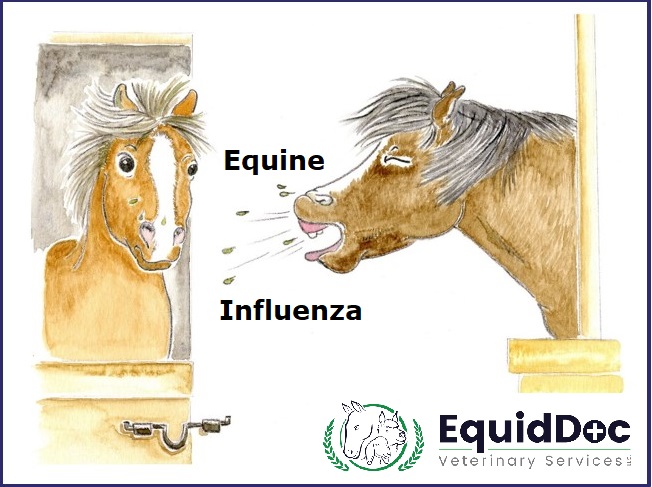Did you know a horse’s COUGH can travel the length of a football field? Keep this in mind while traveling with your horse this summer, whether showing or participating in a group trail ride, hunter pace, or trucking onto another farm for a lesson.

Equine Influenza Virus (EIV) causes a respiratory disease (Flu) that can range from mild to severe. Horses with influenza may have a fever, nasal discharge, lethargy, loss of appetite, and weakness, but most notably COUGH. Because coughing horses aerosolize the virus, equine influenza is very contagious. Horses who are exposed will become sick within 1-3 days. Influenza can affect horses of all ages, though most vulnerable are the very young and the very old due to weaker immune systems. Some horses may be asymptomatic shedders (don’t get sick but can still spread the virus). Horses who get influenza are more susceptible to secondary bacterial infections in the first 2-3 weeks following infection and should be monitored closely for the symptoms mentioned above.
Typical treatment for EIV is supportive care while the virus runs its course. Good nutrition and increased hydration are key to a smooth recovery. Non-steroidal anti-inflammatories (NSAIDs) such as Banamine are often employed to keep fevers controlled and the horse eating and drinking. Diagnosis Is often made on the farm via physical exam, blood work, and collection of nasal swabs or other respiratory samples.
Protection from EIV is achieved via Flu/Rhino vaccines, which are recommended based on a horse’s individual risk. Standard vaccination protocols for multi-horse barns and traveling horses include annual vaccination for EIV with a booster every 6 months. Although most of your travel with your horse may occur in the warm weather months, outbreaks of influenza often occur in the winter months when horses are spending more time in the barn and in close proximity with other horses on the farm.
Aside from vaccination, when it comes to contagious disease, prevention is the best medicine. Attention to good hygiene and distancing between horses is important! When attending events or visiting other farms, avoid sharing equipment, tack, feed, water, etc., and avoid touching other horses. If you are in contact with other horses, wash your hands often, try to keep your clothes clean, change clothes when needed, and disinfect boots often. Clean and disinfect your trailer thoroughly upon returning home. Anytime horses travel off the property or new horses arrive on the farm, horses should be quarantined for 2-3 weeks prior to introducing or re-introducing them to the rest of the horses on the farm. Quarantined horses should be housed away from healthy horses, handled after all the healthy horses have been handled (i.e., clean their stalls & paddocks last), have separate equipment, and should have their temperatures taken and logged twice daily.
If you think your horse has been exposed to a contagious disease, has symptoms of a respiratory infection, or you have questions about vaccination, travel recommendations, and biosecurity, please contact EquidDoc equine veterinary services (508-885-4205 or office@equiddocvet.com) today to discuss!


